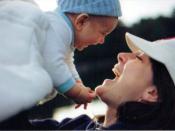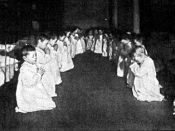This essay intends to define 'Maternal' and 'Deprivation' and Bowlby's Maternal Deprivation Hypothesis (1953). Following this, I aim to discuss some of the research of Michael Rutter (1976 and 1981), Tizard and Hodges (1978), and Cockett and Tripp (1994) who all challenged Bowlby's concept of Maternal Deprivation. Following these challenges, I will briefly state that Bowlby (1956) ended up readdressing his own theory on 'Maternal Deprivation'.
The definition of maternal in the "Oxford Concise Dictionary" (1995) is "of or like a mother, motherly" and the definition of deprivation is "state of suffering from the effects of a poor or loveless home." Psychologists see deprivation as a long-term break in the bond between parent and child. However, the term 'Maternal Deprivation' arises from the work of the developmental psychoanalyst John Bowlby (1907-1990), whose lifetime work was based around studying Childhood through Developmental Psychology. He was interested in finding out about how the patterns of family interaction could affect mental health.
Bowlby believed that there are enormous psychological consequences for a child who has experienced separation from its maternal figure, which he concluded in his '44 Thieves Study ' (1944). Bowlby believed that these effects were taken from childhood into adulthood, thus causing permanent psychological damage.
However, Bowlby was not alone in looking at the effects of separation on children. Michael Rutter (1981) said that he generally supported Bowlby's study, but through his own study, Isle of Wight (1976), he determined that Bowlby had oversimplified the causes and effects of delinquency.
Michael Rutter et al (1976) studied 2000 boys and their families on the Isle of Wight. The aim of the study was to see if separation caused delinquency, as stated in Bowlby's hypothesis. During this study they found out that those who had experienced separation through the illness or death of...


